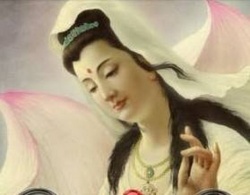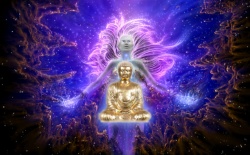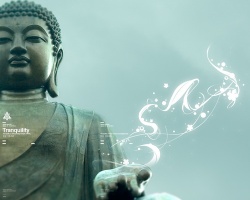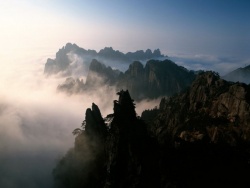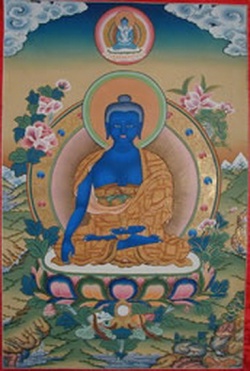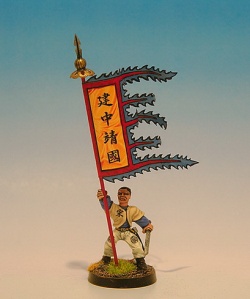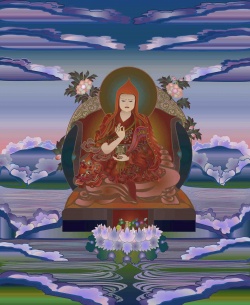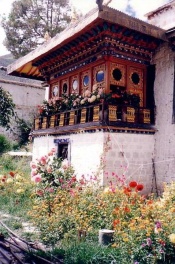13th Dalai Lama
Thubten Gyatso (Tibetan: ཐུབ་བསྟན་རྒྱ་མཚོ་, Wylie: Thub Bstan Rgya Mtsho; 12 February 1876 – 17 December 1933) was the 13th Dalai Lama of Tibet.
In 1878 he was recognized as the reincarnation of the Dalai Lama.
He was escorted to Lhasa and given his pre-novice vows by the Panchen Lama, Tenpai Wangchuk, and named "Ngawang Lobsang Thupten Gyatso Jigdral Chokley Namgyal". In 1879 he was enthroned at the Potala Palace, but did not assume political power until 1895, after he had reached his majority.
Thubten Gyatso was an intelligent reformer who proved himself a skillful politician when Tibet became a pawn in The Great Game between the Russian Empire and the British Empire. He was responsible for countering the British expedition to Tibet, restoring discipline in monastic life, and increasing the number of lay officials to avoid excessive power being placed in the hands of the monks.
Family
The Dalai Lama was born near Samye Monastery, Tak-po province, in 1876.
Agvan Dorzhiev
Agvan Dorzhiev, (1854–1938), a Khori-Buryat Mongol, and a Russian subject, was born in the village of Khara-Shibir, not far from Ulan Ude, to the east of Lake Baikal.
He left home in 1873 at nineteen to study at the Gelugpa monastery, Drepung, near Lhasa, the largest monastery in Tibet. Having successfully completed the traditional course of religious studies, he began the academic Buddhist degree of Geshe Lharampa (the highest level of 'Doctorate of Buddhist Philosophy').
He continued his studies to become Tsanid-Hambo, or "Master of Buddhist Philosophy". He became a tutor and "debating partner" of the teenage Dalai Lama, who became very friendly with him and later used him as an envoy to Russia and other countries.
C.G.E. Mannerheim met Thubten Gyatso in Utaishan during the course of his expedition from Turkestan to Peking. Mannerheim wrote his diary and notes in Swedish (his mother tongue) to conceal the fact that his ethnographic and scientific party was also an elaborate intelligence gathering mission for the Russian army.
The 13th Dalai Lama gave a blessing of white silk for the Russian Tsar and in return received Mannerheim's precious seven-shot officer's pistol with a full explanation of its use as a gift.
- "Obviously," the (Fourteenth Dalai Lama)] said, "The Thirteenth Dalai Lama had a keen desire to establish relations with Russia, and I also think he was a little skeptical toward England at first. Then there was Dorjiev. To the English he was a spy, but in reality he was a good scholar and a sincere Buddhist monk who had great devotion to the Thirteenth Dalai Lama."
Military expeditions in Tibet
After the British expedition to Tibet by Sir Francis Younghusband in early 1904, Dorzhiev convinced the Dalai Lama to flee to Urga in Mongolia, almost 2,400 km (1,500 mi) to the northeast of Lhasa, a journey which took four months. The Dalai Lama spent over a year in Urga and the Wang Khuree Monastery (to the west from the capital) giving teachings to the Mongolians.
In Urga, the Dalai Lama met several times the 9th Bogd Gegeen Jebtsundamba Khutuktu, spiritual leader of Outer Mongolia. The content of these meetings is unknown.
According to report from A.D. Khitrovo, the Russian Border Commissioner in Kyakhta Town, the Dalai Lama and the influential Mongol Khutuktus, high lamas and princes "irrevocably decided to secede from China as an independent federal state, carrying out this operation
under the patronage and support from Russia, taking care to avoid the bloodshed". The Dalai Lama insisted that if Russia would not help, he would even ask Britain, his former foe, for assistance.
After the Dalai Lama fled, the Qing dynasty immediately proclaimed him deposed and again asserted sovereignty over Tibet and made claims over Nepal and Bhutan as well. A convention was signed at the Potala between Great Britain and Tibet in the presence of the Amban and Nepalese and Bhutanese representatives on 7 September 1904.
The provisions of the 1904 convention were confirmed in a 1906 treaty signed between Great Britain and China. The British, for a fee from the Qing court, also agreed "not to annex Tibetan territory or to interfere in the administration of Tibet", while China engaged "not to permit any other foreign state to interfere with the territory or internal administration of Tibet".
In October 1906, John Weston Brooke was the first Englishman to gain an audience with the Dalai Lama, and subsequently he was granted permission to lead two expeditions into Tibet. Also in 1906, Sir Charles Alfred Bell, was invited to visit Thubten Chökyi Nyima, the 9th Panchen Lama at Tashilhunpo, where they had friendly discussions on the political situation.
The Dalai Lama later stayed at the great Kumbum Monastery near Xining and then travelled east to the most sacred of four Buddhist mountain in China, Wutai Shan located 300 km from Beijing.
From here, the Dalai Lama received a parade of envoys:
William Woodville Rockhill, the American Minister in Peking;
Gustaf Mannerheim, a Russian army colonel (who later became the president of independent Finland);
a German doctor from the Peking Legation;
an English explorer named Christopher Irving;
R.F. Johnson, a British diplomat from the Colonial Service; and
Henri D’Ollone, the French army major and viscount.
The Dalai Lama was mounting a campaign to strengthen his international ties and free his kingdom from Chinese rule. Worried about his safety, Mannerheim even gave Tibet's spiritual pontiff a Browning revolver and showed him how to reload the weapon.
In September 1908, the Dalai Lama was granted an audience with Emperor Guangxu and Empress Dowager Cixi. The emperor tried to stress Tibet's subservient role, although the Dalai Lama refused to kowtow to him. He stayed in Beijing until the end of 1908.
When he returned to Tibet in December 1908, he began reorganising the government, but the Qing sent a military expedition of its own to Tibet in 1910 and he had to flee to India.
In 1911 the Qing dynasty was overthrown in the Xinhai Revolution and by the end of 1912 the last Qing troops had been escorted out of Tibet.
Assumption of political power
In 1895, Thubten Gyatso assumed ruling power from the monasteries which had previously wielded great influence through the Regent.
Due to his two periods of exile in 1904–1909, to escape the British invasion of 1904, and from 1910–1913 to escape a Chinese invasion, he became well aware of the complexities of international politics and was the first Dalai Lama to become aware of the importance of foreign relations.
The Dalai Lama, "accompanied by six ministers and a small escort" which included his close aide, diplomat and military figure [[Tsarong] Dzasa]], fled via Sikkim to Darjeeling, where they stayed almost two years. During this period he was invited to Calcutta by the Viceroy, Lord Minto, which helped restore relations with the British.
Thubten Gyatso returned to Lhasa in January 1913 with Tsarong Dzasa from Darjeeling, where he had been living in exile. The new Chinese government apologised for the actions of the previous Qing dynasty and offered to restore the Dalai Lama to his former position. He replied that he was not interested in Chinese ranks and was assuming spiritual and political leadership of Tibet.
After his return from exile in India in 1913, Thubten Gyatso assumed control of foreign relations and dealt directly with the Maharaja and the British Political officer in Sikkim and the king of Nepal rather than letting the Kashag or parliament do it.
Thubten Gyatso declared independence from China in early 1913, after returning from India following three years of exile. He then standardized the Tibetan flag in its present form. At the end of 1912 the first postage stamps of Tibet and the first bank notes were issued.
Thubten Gyatso built a new medical college (Mentsikang) in 1913 on the site of the post-revolutionary traditional hospital near the Jokhang.
Legislation was introduced to counter corruption among officials, a national taxation system was established and enforced, and a police force was created. The penal system was revised and made uniform throughout the country. "Capital punishment was completely abolished and corporal punishment was reduced. Living conditions in jails were also improved, and officials were designated to see that these conditions and rules were maintained."
A secular education system was introduced in addition to the religious education system. Thubten Gyatso sent four promising students to England to study, and welcomed foreigners, including Japanese, British and Americans.
As a result of his travels and contacts with foreign powers and their representatives (e.g., Pyotr Kozlov, Charles Bell and Gustaf Mannerheim), the Dalai Lama showed an interest in world affairs and introduced electricity, the telephone and the first motor cars to Tibet. Nonetheless, at the end of his life in 1933, he saw that Tibet was about to enter a dark age.
In 1932, the Muslim Qinghai and Han-Chinese Sichuan armies of the National Revolutionary Army led by Chinese Muslim General Ma Bufang and Han General Liu Wenhui defeated the Tibetan army in the Sino-Tibetan War when the 13th Dalai Lama tried to seize territory in Qinghai and Xikang.
Ma Bufang overran the Tibetan armies and recaptured several counties in Xikang province. Shiqu, Dengke, and other counties were seized from the Tibetans. The Tibetans were pushed back to the other side of the Jinsha river.
Ma and Liu warned Tibetan officials not to dare cross the Jinsha river again. Ma Bufang defeated the Tibetans at Dan Chokorgon. Several Tibetan generals surrendered, and were demoted by the Dalai Lama.
By August, the Tibetans lost so much land to Liu Wenhui and Ma Bufang's forces that the Dalai Lama telegraphed the British government of India for assistance. British pressure led to Nanjing declaring a ceasefire. Separate truces were signed by Ma and Liu with the Tibetans in 1933, ending the fighting.
Prophecies
The 13th Dalai Lama predicted before dying:
- "Very soon in this land (with a harmonious blend of religion and politics) deceptive acts may occur from without and within.
At that time, if we do not dare to protect our territory, our spiritual personalities including the Victorious Father and Son (Dalai Lama and Panchen Lama) may be exterminated without trace, the property and authority of our Lakangs (residences of reincarnated lamas) and monks may be taken away.
Moreover, our political system, developed by the Three Great Dharma Kings (Tri Songtsen Gampo, Tri Songdetsen and Tri Ralpachen) will vanish without anything remaining.
The property of all people, high and low, will be seized and the people forced to become slaves. All living beings will have to endure endless days of suffering and will be stricken with fear. Such a time will come."
Furthermore, the 13th Dalai Lama went on to predict the invasion of Tibet and announced that he would die early, in order that his successor would be old enough to act as a leader for the Tibetan people at the time of this invasion. He died a few months later in Lhasa, in December 1933.

